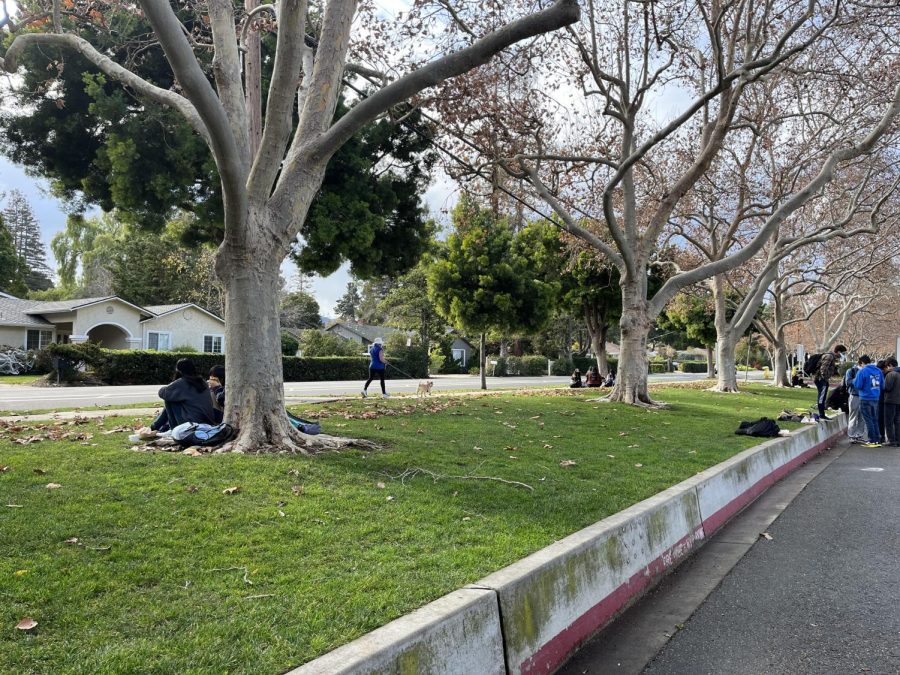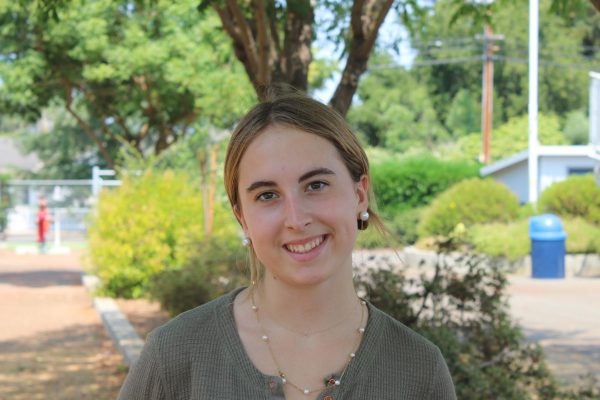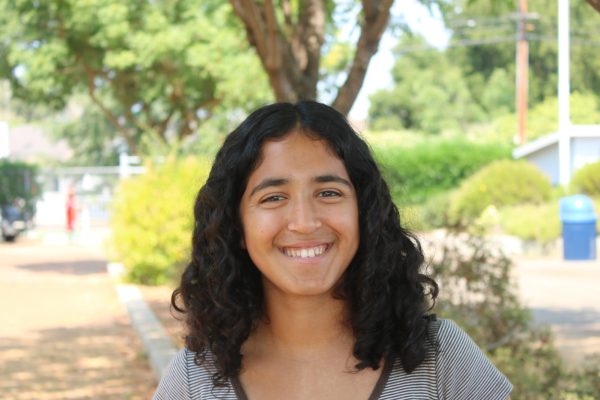A story untold: the LAHS ice cream salesman
Students sit on the grassy area at lunch where Gregorio can usually be found selling his ice cream and popsicles. While he is a common sight on campus, few know his name, let alone his story.
It’s another lukewarm day in Los Altos, and the scheduled grumbling of students’ stomachs signals an incoming stampede to the quad. Soggy pizza won’t cut it; the students crave something sweet and cold. As they near the front of campus, the answer is revealed, standing behind a refrigerated box on wheels. The chimes of this mystery man’s bells send students flocking to him. Reaching in and brushing off ice, the man hands each student a delicious treat, just what they needed to get through the school day.
Everyone knows the Los Altos High School popsicle salesman, but no one knows his story.
Gregorio moved to Los Altos last March from Hidalgo, Mexico. Leaving behind his familiar life was not an easy decision, but it was a necessary one in order to give his family the life they deserve. He left behind his four kids: Elizabeth, Amanda, Andres and Daniel, and his wife, Julieta.
“I come to work to support me, my family, my house, expenses, everything,” Gregorio said in Spanish while brushing the ice off a popsicle to hand to a customer.
Before moving to California, Gregorio said he worked selling tamales in Mexico City. He took up other jobs during the COVID-19 pandemic to combat the loss of business, but eventually, it wasn’t enough. As sales gradually declined, Gregorio recalls a particular moment of defeat.
“[There] came a moment where I said… ‘I just can’t do it,’” Gregorio said.
So, he called one of his brothers, asking for help. His brother offered him a job working for their cousin’s business in California. With no other choice that he could see, Gregorio took the chance and left his home country of Mexico.
His cousin runs a business which employs street vendors around the Bay Area. The business, which his cousin has run for 20 years, also employs two of Gregorio’s brothers. Gregorio is thankful for the opportunity to work alongside his family, but admits that he does not have a close relationship with them.
“[My] family, instead of supporting you, they want to see you stuck in the same place,” Gregorio said. ”There is no support, no tips, there is no union, and if there is [a] union there’s avarice.”
Despite the tensions between his family, Gregorio finds comfort in having a more stable income. He usually sends money to his family every fifteen weeks, although with the recent cooler weather, it has been pushed back to every twenty weeks. His work is the only thing keeping his family afloat.
After being here for over a year, Gregorio has established a familiar routine. His day begins early, with his brother or cousin dropping him off at the place of their choosing. Gregorio still doesn’t know the area well and relies on his cousin’s knowledge. Gregorio comes to campus during lunch to sell frozen goods, mostly popsicles and ice cream. Afterward, he walks around to find business where he can. At around 6 p.m., his brother picks him up to return home and count his inventory. He often likes to take a stroll around a park close to where he lives before going to sleep and starting the day all over again.
Home for Gregorio is currently a van that he parks in a lot of an apartment building. He constantly worries about his safety and health, especially now that it is getting cold. To stay warm at night, he wraps himself in two blankets.
“I don’t feel safe,” he said simply.
Gregorio came across LAHS through serendipitous chance. His brother dropped him off at campus the first week he moved. He was completely new to the country and knew little English, but started doing what he knew best: connecting with people. First he met Student Conduct Liaison Julie Corzine, who checked his cart and talked with him about his business. Corzine respected his work ethic and gave him the class schedule in which he could best sell to students.
“We talked to him about the trash and he has gone above and beyond to clean up,” Corzine said while describing his commitment.
Building relationships with his clients is very important to Gregorio. He only speaks Spanish and simply does not have the time to learn a new language, making communication difficult. Thankfully, he has found other ways to communicate and found that the language barrier has not limited his business as much as he expected.
Even with his unyielding perseverance, there are some challenges that cannot be overcome. Gregorio is blind in his right eye and is quickly losing sight in his other. Without immediate health services, Gregorio will lose his eyesight fully and be stranded here unable to return to his family. Julieta, his wife, does not know about Gregorio’s declining condition, as he doesn’t want to worry her anymore than he has to.
“I don’t tell [Julieta] or my kids anything, because I don’t want them to overthink,” Gregorio said.
Attempting to independently take charge of his health, Gregorio recently went to a clinic in search of medical help. The experience only left him more discouraged, as he was turned away for not having health insurance. He described the frustrating process of being discarded simply because he couldn’t afford it.
“I’m not worth anything. In order for them to take me into account, I need to pay private insurance,” Gregorio said. “That’s the only way.”
Gregorio called back and paid a fee to begin the process of getting insurance, but he fears it won’t be enough to get the help he needs.
Even though moving to California has posed several issues, Gregorio reflects on his decision to move as a positive one.
“Little by little, I’ve been able to support my kids,” he said happily. “With my efforts, I’ve been able to make a better home for them.”
Since moving, Gregorio has been able to support his family in ways he never could before. Their house is much safer and each kid has their own room.
Gregorio hopes to one day return to Hidalgo and reunite with his family. Until then, he’ll return to work with a smile on his face, proudly wearing his head-to-toe San Francisco merch to showcase his pride in the place he now calls home.







Shakti Ann Kanyal | Mar 14, 2023 at 9:09 pm
Great Article I hope everything goes well for Gregorio.
S | Mar 14, 2023 at 8:56 pm
Amazing article Matilda!